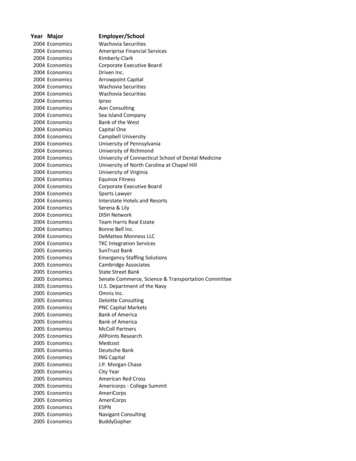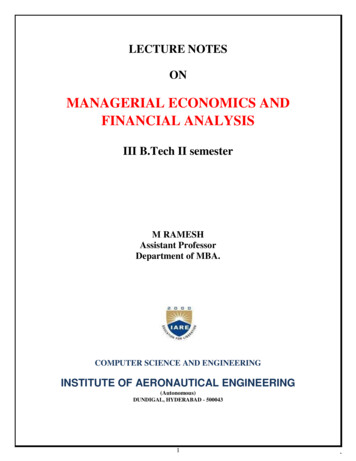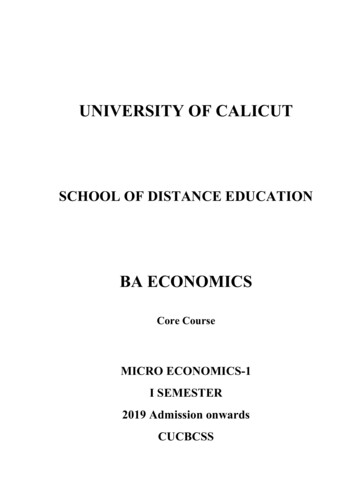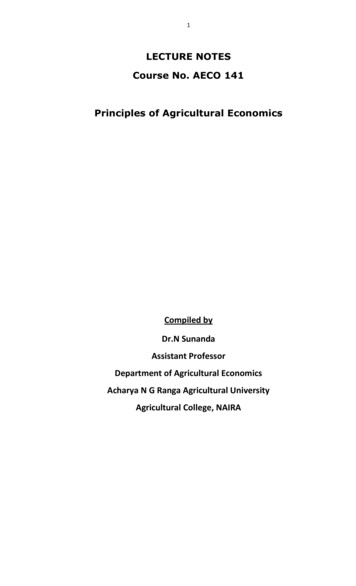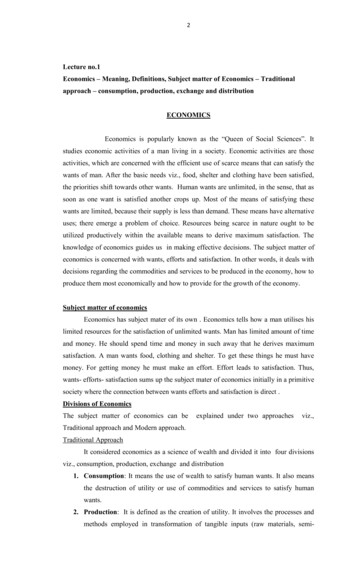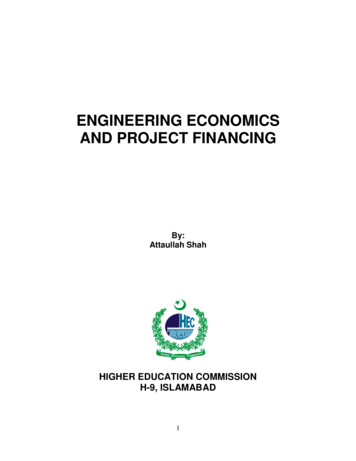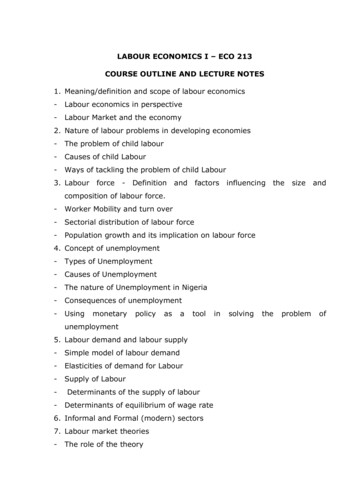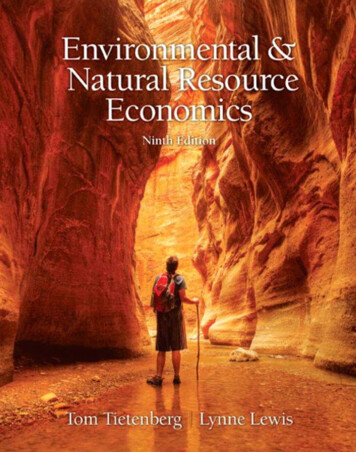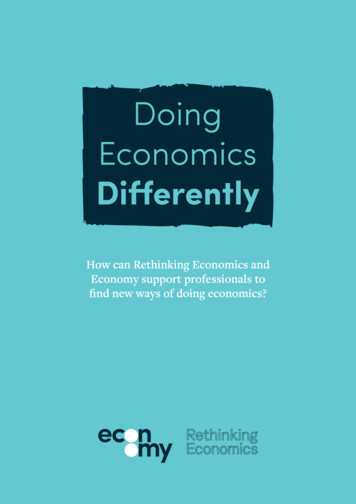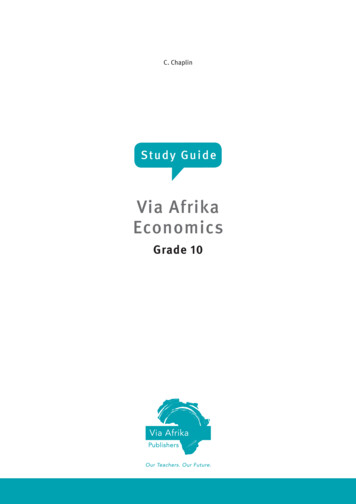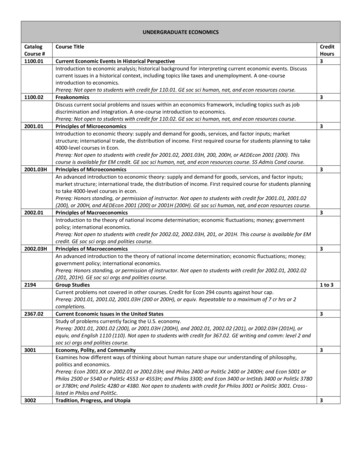
Transcription
UNDERGRADUATE ECONOMICSCatalogCourse 367.0230013002Course TitleCurrent Economic Events in Historical PerspectiveIntroduction to economic analysis; historical background for interpreting current economic events. Discusscurrent issues in a historical context, including topics like taxes and unemployment. A one-courseintroduction to economics.Prereq: Not open to students with credit for 110.01. GE soc sci human, nat, and econ resources course.FreakonomicsDiscuss current social problems and issues within an economics framework, including topics such as jobdiscrimination and integration. A one-course introduction to economics.Prereq: Not open to students with credit for 110.02. GE soc sci human, nat, and econ resources course.Principles of MicroeconomicsIntroduction to economic theory: supply and demand for goods, services, and factor inputs; marketstructure; international trade, the distribution of income. First required course for students planning to take4000-level courses in Econ.Prereq: Not open to students with credit for 2001.02, 2001.03H, 200, 200H, or AEDEcon 2001 (200). Thiscourse is available for EM credit. GE soc sci human, nat, and econ resources course. SS Admis Cond course.Principles of MicroeconomicsAn advanced introduction to economic theory: supply and demand for goods, services, and factor inputs;market structure; international trade, the distribution of income. First required course for students planningto take 4000-level courses in econ.Prereq: Honors standing, or permission of instructor. Not open to students with credit for 2001.01, 2001.02(200), or 200H, and AEDEcon 2001 (200) or 2001H (200H). GE soc sci human, nat, and econ resources course.Principles of MacroeconomicsIntroduction to the theory of national income determination; economic fluctuations; money; governmentpolicy; international economics.Prereq: Not open to students with credit for 2002.02, 2002.03H, 201, or 201H. This course is available for EMcredit. GE soc sci orgs and polities course.Principles of MacroeconomicsAn advanced introduction to the theory of national income determination; economic fluctuations; money;government policy; international economics.Prereq: Honors standing, or permission of instructor. Not open to students with credit for 2002.01, 2002.02(201, 201H). GE soc sci orgs and polities course.Group StudiesCurrent problems not covered in other courses. Credit for Econ 294 counts against hour cap.Prereq: 2001.01, 2001.02, 2001.03H (200 or 200H), or equiv. Repeatable to a maximum of 7 cr hrs or 2completions.Current Economic Issues in the United StatesStudy of problems currently facing the U.S. economy.Prereq: 2001.01, 2001.02 (200), or 2001.03H (200H), and 2002.01, 2002.02 (201), or 2002.03H (201H), orequiv, and English 1110 (110). Not open to students with credit for 367.02. GE writing and comm: level 2 andsoc sci orgs and polities course.Economy, Polity, and CommunityExamines how different ways of thinking about human nature shape our understanding of philosophy,politics and economics.Prereq: Econ 2001.XX or 2002.01 or 2002.03H; and Philos 2400 or PolitSc 2400 or 2400H; and Econ 5001 orPhilos 2500 or 5540 or PolitSc 4553 or 4553H; and Philos 3300; and Econ 3400 or IntStds 3400 or PolitSc 3780or 3780H; and PolitSc 4280 or 4380. Not open to students with credit for Philos 3001 or PolitSc 3001. Crosslisted in Philos and PolitSc.Tradition, Progress, and UtopiaCreditHours3333331 to 3333
014002.02Examines how different ways of thinking about social and political change shape our understanding ofphilosophy, and economics.Prereq: Econ 2001.XX or 2002.01 or 2002.03H; and Philos 2400 or PolitSc 2400 or 2400H; and Econ 5001 orPhilos 2500 or 5540 or PolitSc 4553 or 4553H; and Philos 3300; and Econ 3400 or IntStds 3400 or PolitSc 3780or 3780H; and PolitSc 4280 or 4380. Not open to students with credit for Philos 3002 or PolitSc 3002. Crosslisted in Philos and PolitSc.Ethics and Social Responsibility in Economic LifeExamines the role of ethical norms and social constraints in determining economic outcomes.Prereq: At least one of these courses, 1100.01 (110.01), 1100.02 (110.02), 1100.03 (110.03), 2001.01,2001.02 (200), 2001.03H (200H), 2002.01 2002.02 (201), or 2002.03H (201H), is recommended. Not open tostudents with credit for 348. GE soc sci indivs and groups course.The Analysis and Display of DataIntroduction to the analysis of data. Topics include sampling, data collection, probability, inference, randomvariables, display of data, correlation, and analysis of variance. This course does not count toward a courseelective for Econ majors.Prereq: Not open to students with credit for 4400 (444), 5410 (641), 5420 (642), 443, IntStds 3400 (443), Stat1430 (133), 1450 (145), 2450 (245) or AEDEcon 2005 (205). GE data anly course. Cross-listed in IntStds.Economics of CrimeInvestigates incentives and deterrents to criminal activity with respect to general economic conditions andanalyzes the effectiveness of public policies designed to deter crime.Prereq: 2001.01, 2001.02 (200), or 2001.03H (200H), or equiv. Not open to students with credit for 479.The Economics of Gender in Labor MarketsApplication of economic analysis to the evolution and economic condition of women and men in the laborforce; occupational distribution and segregation; wage gap; the glass ceiling.Prereq: 2001.01, 2001.02 (200), or 2001.03H (200H), or equiv. Not open to students with credit for 482. GEdiversity soc div in the US course.The Other Side of the Border: Immigration EconomicsThis is a service-learning opportunity with Esperanza International in Tijuana, Mexico. The course willintroduce micro and macroeconomic issues related to immigration. This case study will focus on theopportunity costs for immigrants, the effects of the flow of money, and the loss of labor and human capitalon economic growth. Students will work with the immigrant community.Prereq: 2001.01, 2001.02, 2002.01 or 2002.02, or AEDEcon 2001. GE service learning course.Intermediate Microeconomic TheoryTheory of consumer behavior; theory of the firm; costs and production; factor price determination; generalequilibrium.Prereq: 2001.01, 2001.02 (200), or 2001.03H (200H), and 2002.01, 2002.02 (201), or 2002.03H (201H), orequiv. Not open to students with credit for 4001.02 or 4001.03 (501.01 or 501.02).Intermediate Microeconomic TheoryTheory of consumer behavior; theory of the firm; costs and production; factor price determination; generalequilibrium. Designates a calculus-based version.Prereq: 2001.01, 2001.02 (200), or 2001.03H (200H), and 2002.01, 2002.02 (201), or 2002.03H (201H), andMath 1131 (132), 1151 (151), 1152 (152 and 153), 1161 (161 and 162), 2182H (263H), or 4181H (190H) orequiv; or permission of instructor. Not open to students with credit for 4001.01 (501.01 and 501.02) or4001.03H.Intermediate Microeconomic TheoryTheory of consumer behavior; theory of the firm; costs and production; factor price determination; generalequilibrium. Designates an advanced calculus-based version.Prereq: 2001.01, 2001.02 (200), or 2001.03H (200H), and 2002.01, 2002.02 (201), or 2002.03H (201H), andMath 1131 (132), 1151 (151), 1152 (152 and 153), 1161 (162 and 161), 2182H (263H), or 4181H (H190), orequiv, or permission of instructor. Not open to students with credit for 4001.01 (501.01) or 4001.02 (501.02).Intermediate Macroeconomic TheoryAnalysis of the determinants of national output; income and employment levels; theory of economic growthand progressive equilibrium in an economy.Prereq: 2001.01, 2001.02 (200), or 2001.03H (200H), and 2002.01, 2002.02 (201 or 201H), or 2002.03H, orequiv. Not open to students with credit for 4002.02 (502.01 or 502.02) or 4002.03.Intermediate Macroeconomic Theory3333333333
is of the determinants of national output; income and employment levels; theory of economic growthand progressive equilibrium in an economy. Designates a calculus-based version.Prereq: 2001.01, 2001.02 (200), or 2001.03H (200H), and 2002.01, 2002.02 (201), or 2002.03H (201H), andMath 1131 (132) or 1151 (151), 1152 (152 and 153), 1161 (161 and 162), 2182H (263H), or 4181H (190H), orequiv; or permission of instructor. Not open to students with credit for 4002.01 (502.01 or 502.02) or4002.03.Intermediate Macroeconomic TheoryAnalysis of the determinants of national output; income and employment levels; theory of economic growthand progressive equilibrium in an economy. Designates an advanced calculus-based version.Prereq: 2001.01, 2001.02 (200), or 2001.03H (200H), and 2002.01, 2002.02 (201), or 2002.03H (201H), andMath 1152 (152 and 153), 1161 (161 and 162), 2182H (263H), or 4181H (190H), or equiv; or permission ofinstructor. Not open to students with credit for 4002.01 (502.01) or 4002.02 (502.02).Experimental EconomicsIntroduction to economics as an experimental social science. Students participate in and study results ofeconomic experiments dealing with markets, individual decision making, and a broad array of game theoreticeconomic modelsPrereq: 2001.01, 2001.02 (200), or 2001.03H (200H) or equiv. Not open to students with credit for 505.Experimental EconomicsIntroduction to economics as an experimental social science. Students participate in and study results ofeconomic experiments dealing with markets, individual decision making, and a broad array of game theoreticeconomic models.Prereq: 4001.01 (501.01), 4001.02 (501.02) or 4001.03, and Stat 1450 or 2450. Not open to students withcredit for 4050 (505).World Economic Development in Historical PerspectiveA survey of economic development from the middle ages through the 20th century, emphasizing Europe,Asia and Africa.Prereq: 2001.01, 2001.02 (200), or 2001.03H (200H), or 2002.01, 2002.02 (201) or 2002.03H (201H), or equiv.Not open to students with credit for 5130 (614), or 515. GE historical study and diversity global studiescourse.Economic History of the AmericasA survey of economic development in the Americas emphasizing the United States from colonial times to the20th century.Prereq: 2001.01, 2001.02 (200), or 2001.03H (200H), or 2002.01, 2002.02 (201), or 2002.03H (201H), orequiv. Not open to students with credit for 5140 (613) or 516. GE historical study and diversity global studiescourse.InternshipsAllows students to apply knowledge from their economics courses and learn from hands on experience inapproved positions. Applies toward an Econ 4000-level elective; 3 credit hours maximum toward major.Prereq: 2001.01, 2001.02 (200), or 2001.03H (200H), and 2002.01, 2002.02 (201), or 2002.03H (201H), orequiv; and Jr or Sr standing; and enrollment in Econ major; and permission of department. Not open tostudents with maximum qtr cr hrs in 589. Repeatable to a maximum of 6 cr hrs or 2 completions. This courseis graded S/U.Group StudiesIntermediate current problems not covered in other courses.Prereq: 2001.01, 2001.02 (200), or 2001.03H (200H), and 2002.01, 2002.02 (201), or 2002.03H (201H). Credittaken as 594 counts toward hour cap. Repeatable to a maximum of 10 cr hrs or 3 completions.Money and BankingOrganization, operation, and economic significance of our monetary and banking system; special referenceto current conditions and problems. Students intending to take 5200 are encouraged to take it instead.Prereq: 2001.01, 2001.02 (200), or 2001.03H (200H), and 2002.01, 2002.02 (201), or 2002.03H (201H), orequiv. Not open to students with credit 4200H (520H), 5200, or 520.Government Finance in the American EconomyAnalysis of fiscal institutions and decision-making in the public sector of the American economy; budgetplanning and execution; taxation, debt, and fiscal policy.Prereq: 2001.01, 2001.02 (200), or 2001.03H (200H), or equiv. Not open to students with credit for 530.Local Public Finance333331 to 61 to 10333
ing public services by state/local governments. The fiscal relationship between state/localgovernments and the federal government. Apply techniques of economic analysis to policy issues.Prereq: 4300 (530), or PubAfrs 7120 (730), or equiv. Not open to students with credit for 531, or PubAfrs 4310(531). Cross-listed in PubAfrs.Public Expenditure and Cost-Benefit AnalysisEconomics of public choice, public goods, non-market allocations, collective decision-making, and netbenefit maximization for policy majors; case studies and empirical analysis of public choice problems forpolicy analysts. Does not count towards units in the economics major.Prereq: 2001.01, 2001.02 (200), or 2001.03H (200H), or equiv, and enrollment in JGSPA major. Not open tostudents with credit for 4300, 4310, or 532.Elementary EconometricsBasic linear regression analysis with applications; hypothesis testing and model specification.Prereq: 3400, IntStds 3400, Stat 1430 (133), 1450 (145), 2450 (245), or AEDEcon 2005 (205), or equiv. Notopen to students with credit for 5410 (641), 5420 (642), or 444.Economic DevelopmentEmpirical and theoretical consideration of long-term economic changes, including changes in industrialstructure, technology, and level of national product; emphasis on developing economies.Prereq: 2001.01, 2001.02 (200), or 2001.03H (200H), and 2002.01, 2002.02 (201), or 2002.03H (201H), orequiv. Not open to students with credit for 550.Middle Eastern Economic DevelopmentIntroduction to current economic issues facing the Middle East; similarities and differences in Middle Easterncountries' growth, inflation, unemployment, fiscal and monetary policy, imports, exports, foreign debt andexchange rate policy.Prereq: 2001.01, 2001.02 (200), 2001.03H (200H), or AEDEcon 2001 (200), and 2002.01, 2002.02 (201), or2002.03H (201H), or equiv. Not open to students with credit for 537, AEDEcon 4537 (537), 437, IntStds 4537(537), or 437. Cross-listed in AEDEcon and IntStds.Economics of PopulationUsing economic principles to analyze population growth, fertility, mortality, mating, dating, marriage, teenpregnancy, divorce, and migration.Prereq: 2001.01, 2001.02 (200), or 2001.03H (200H), or 2002.01, 2002.02 (201), or 2002.03H (201H). Notopen to students with credit for 553.Cooperation and Conflict in the Global EconomyThe economic, social, and political bases for and responses to increasing global economic integration.Prereq: 2001.01, 2001.02 (200), or 2001.03H (200H), and 2002.01, 2002.02 (201), or 2002.03H (201H), orequiv. Not open to students with credit for 4560H (556H), 556, IntStds 4560 (556), or 4560H (556H). Crosslisted in IntStds.Issues of the Underground EconomyFocuses on the informal sector of the underground economy: illegal drugs, arms sales and human trafficking.Applies economic reasoning. Recommended prereqs: 2001.01, 2001.02 (200), 2001.03H (200H), and2002.01, 2002.02 (201), or 2002.03H (201H).Prereq: Jr standing and above. Not open to students with credit for 597.01. GE cross-disciplinary seminarcourse.Government and BusinessEconomic and legal aspects of government regulation of business in the United States; philosophies andconcepts of public control; contemporary problems. Students planning on taking 5700 are encouraged totake it instead.Prereq: 2001.01, 2001.02 (200), or 2001.03H (200H), or equiv. Not open to students with credit for 5700(670), or 570.Government and BusinessEconomic and legal aspects of government regulation of business in the United States: philosophies andconcepts of public control; contemporary problems.Prereq: Honors standing, and 2001.01, 2001.02, 2001.03H, 4001.01, 4001.02 or 4001.03, and Math 1151. Notopen to students with credit for 4700 (570) or 5700 (670).Study at a Foreign Institution3333333331 to 10
4800483048314960H49984998H49994999H50015130An opportunity for students to study at a foreign institution and receive Ohio State credit for that work.Students will pay Ohio State fees and any fees in excess of Ohio State tuition, as well as all travel andsubsistence costs.Prereq: Permission of dept chairperson. Repeatable to a maximum of 30 cr hrs or 30 completions. This courseis progress graded (S/U).Labor Economics and Industrial RelationsSurvey of the field of labor economics; trade unionism, collective bargaining; wage determination,employment, unemployment; labor legislation. Students planning on taking 5850 are encouraged to take itinstead.Prereq: 2001.01, 2001.02 (200), or 2001.03H (200H), or equiv. Not open to students with credit for 5850 (685)or 580.Economics of SportsAnalysis of economic and business aspects of sports teams and their strategic interactions in sports markets.Prereq: 2001.01, 2001.02 (200), or 2001.03H (200H), or equiv. Not open to students with credit for 583.Sports Data Analytics and Economic AnalysisAn introduction to basic data analysis methods used by economists to explain economic reasoning in thesport industry and associated markets.Prereq: 2001.01, 2001.02, 2001.03H, AEDEcon 2001, or 2001H.Honors Seminar in EconomicsPrepares students to write an undergraduate thesis; group discussion of research problems, methods, andstrategies.Prereq: Honors standing, and 4001.01 (501.01), 4001.02 (501.02), or 4001.03, and 4002.01 (502.01), 4002.02(502.02), or 4002.03; or permission of instructor. Not open to students with credit for 596H.Undergraduate Research in EconomicsDirected research for an Economics major; collection and analysis of data and information for a researchproject.Prereq: 4001.01 (501.01), 4001.02 (501.02), or 4001.03, and 4002.01 (502.01), 4002.02 (502.02), or 4002.03,or equiv, and permission of instructor. Not open to students with credit for 4998H or 699. This course isgraded S/U.Honors Research in EconomicsDirected research for an economics major; collection and analysis of data and information for a researchproject.Prereq: Honors standing; and 4001.01 (501.01), 4001.02 (501.02), or 4001.03, and 4002.01 (502.01), 4002.02(502.02), or 4002.03, or equiv; and permission of instructor. Not open to students with greater than 9 cr hrs in4998 or max credit in 699. Repeatable to a maximum of 10 cr hrs or 2 completions. This course is graded S/U.Undergraduate Thesis ResearchA program of study arranged for each student, with individual conferences and reports, to write a seniorthesis. At least two semesters are required of candidates for the degree with distinction in economics.Prereq: At least half of the Econ courses taken and an average of B in the remainder, and Sr standing, andpermission of instructor. Not open to students with greater than 9 hours credit for 4999H (699) or max creditin 783H. Repeatable to a maximum of 10 cr hrs or 10 completions. This course is graded S/U.Honors Thesis ResearchA program of study arranged for each student, with individual conferences and reports, to write a seniorthesis. At least 2 sems required for distinction in econ. Failure to receive a mark of S in this course is adisqualification for special honors.Prereq: Honors standing, and a grade of A in at least half of the Econ courses taken, and an average of B inthe remainder, and Sr standing, and permission of instructor. Not open to students with credit for 4999(783H). Credit in 783H counts toward hour cap. Repeatable to a maximum of 10 cr hrs or 10 completions. Thiscourse is graded S/U.Game Theory in EconomicsAnalysis of behavior in strategic situations - when a person or firm's best action depends on what others do.Prereq: 4001.01 (501.01), 4001.02 (501.02), or 4001.03, and Math 1131 (132), 1151 (151 and 152), 1152(153), 1161 (161 and 162), or 2182H (263H), or equiv. Not open to students with credit for 601.Economic History of Western Europe33331 to 61 to 61 to 51 to 534
51405150519351945250526152625410542056505660Survey of economic development of Europe from pre-industrialization to current globalization. Emphasis oncritical analysis of long-run factors in economic growth.Prereq: 4400 (444), 5410 (641), or Stat 2450 (245), and Econ 4001.01 (501.01), 4001.02 (502.02), or 4001.03,and 4002.01 (502.01), 4002.02 (502.02), or 4002.03, or equiv; or Grad standing. Not open to students withcredit for 614.Economic History of the United StatesGeneral survey from discovery of America to present; European economic background; westward movementand its effects; development of economic institutions in the United States.Prereq: 4400 (444), 5410 (641), 4001.01 (501.01), 4001.02 (502.02), 4001.03, and 4002.01 (502.01), 4002.02(502.02), or 4002.03, or Stat 2450 (245), or equiv; or Grad standing. Not open to students with credit for 613.Economic Transitions in the 20th CenturyGeneral survey of economic aspects of developing economies. Transitions from central planning to marketsand from underdevelopment to industrialization in the twentieth century are emphasized.Prereq: 4400 (444), 5410 (641), or Stat 2450 (245), and 4001.01 (501.01), or 4001.02 (501.02), or 4001.03,and 4002.01 (502.01), 4002.02 (502.02), or 4002.03 or equiv; or permission of instructor. Not open tostudents with credit for 615.Individual StudiesAdvanced readings in economics and related fields.Prereq: Jr standing or higher; and an average of B or better in all econ courses; and a CPHR of 3.00 or above.Repeatable to a maximum of 10 cr hrs or 10 completions. This course is graded S/U.Group StudiesAdvanced current problems not covered in other courses.Prereq: 4001.01 (501.01), 4001.02 (501.02), or 4001.03, or equiv. Repeatable to a maximum of 10 cr hrs or 10completions.National and International Money MarketsOrganization, functions, and control of money markets and their submarkets; flow of funds in these marketsand investment policies of market participants.Prereq: 4400 (444), or 5410 (641), and 4001.01 (501.01), 4001.02 (501.02), or 4001.03, and 4002.01 (502.01),4002.02 (502.02), or 4002.3, or Stat 2450 (245), or equiv. Not open to students with credit for 625.Financial Economics IExamination of the evolution of and economic issues facing financial markets, financial institutions, andfinancial market participants. Does not count as course credit towards the completion of a business major.Prereq: 4001.01, 4001.02, or 4001.03, and 4002.01, 4002.02, or 4002.03, and Math 1151, 1152, 1161, or2182H, or equiv.; or Grad standing.Financial Economics IIExamination of academic literature and econometric analysis of topics involving financial markets, financialinstitutions, and financial market participants. Does not count as course credit towards the completion of abusiness major.Prereq: 4001.01, 4001.02, or 4001.03, and 4002.01, 4002.02, or 4002.03, and 5261, and Math 1151, 1152,1161, or 2182H, or equiv.; or Grad standing.Econometrics IThe general linear regression model; multiple correlation, path analysis, analysis of variance and tests ofsignificance; specification errors.Prereq: 4001.01 (501.01), 4001.02 (501.02), or 4001.03, and Stat 2450 (245), 4201, 4202 (420, 421), or 3470(427, 428), or equiv. Not open to students with credit for 641, 444, or 4400.Econometrics IIDiscrete choice models, panel data, endogeneity, instrumental variables, and systems of equations;stationary and nonstationary time series; applications in various fields of economics. Continuation of 5410.Prereq: 5410 (641) and 4002.01, 4002.02 (502.01), or 4002.03 (502.02), or PubAfrs 7571, or equiv. Not opento students with credit for 642.International Commodity Flows: Theory and PolicyComparative advantage and the gains from trade; tariffs and other trade restrictions; economic effects ofprotective policies; U.S. commercial policies; regional economic integration.Prereq: 4001.01 (501.01), 4002.01 (502.01), 4001.02 (501.02), 4002.02 (502.02), 4001.03, or 4002.03; and4400 (444), 5410 (641), or Stat 2450 (245) or equivs. Not open to students with credit for 665.Financial Aspects of International Trade441 to 101 to 53333333
57005720585058605870International payments and receipts; foreign exchange markets; balance-of-payments adjustment underdifferent monetary systems; macroeconomic policy; international monetary reforms; foreign investments;multinational corporations.Prereq: 4400 (444), 5410 (641), or Stat 2450 (245), and 4002.01 (502.01), 4002.02 (502.02), or 4002.03, orequiv. Not open to students with credit for 666.Industrial OrganizationNature, role, and regulation of competition; market structure and social performance; antitrust laws; currenteconomic, legal, and policy problems in the antitrust area.Prereq: 4400 (444), 5410 (641), or Stat 2450 (245), and 4001.01 (501.01), 4001.02 (501.02), or 4001.03, orequiv; or Grad standing. Not open to students with credit for 670.Comparative Institutional Analysis of Firms and MarketsApplications of economic analysis to industrial organizations including the firm's internal incentive structure,labor markets, and financial institutions, of major market economies such as U.S., and Japan fromcomparative perspectives.Prereq: 4001.01 (501.01), 4001.02 (501.02), or 4001.03, or equiv, or Grad standing. Not open to studentswith credit for 672.Labor EconomicsAdvanced study of the labor market including labor demand and supply, wage determination, andunemployment.Prereq: 4400 (444), 5410 (641), or Stat 2450 (245); and 4001.01 (501.01), 4001.02 (501.02), or 4001.03, orequiv. Not open to students with credit for 685.Health EconomicsAn introductory course to the field of health economics. Students will to apply concepts from introductoryand intermediate microeconomics to problems that are faced in health and medical care. The focus is onindividual demand for medical care; health insurance; markets for, and institutional features of, health careproviders; measuring and pricing quality, and healthcare reform.Prereq: 4001.01, 4001.02, or 4001.03. Prereq or concur: Stat 1450 or 2450.Neuroeconomics and Decision NeuroscienceThe focus of this course will be on the psychology and neuroscience underlying economic behavior.Discussion will cover various domains of economic decision making and what Neuroeconomics has taught usabout them.Prereq: AEDEcon 2005, Stat 1450, 2450, Psych 2220, or Econ 3400; and Math 1148 or higher; and Econ4001.01, 4001.02, 4001.03, AEDEcon 4001, Psych 3313, 3513, or 4508. Not open to students with credit forPsych 5870. Cross-listed in Psych.33333
Examines how different ways of thinking about social and political change shape our understanding of philosophy, and economics. Prereq: Econ 2001.XX or 2002.01 or 2002.03H; and Philos 2400 or PolitSc 2400 or 2400H; and Econ 5001 or

